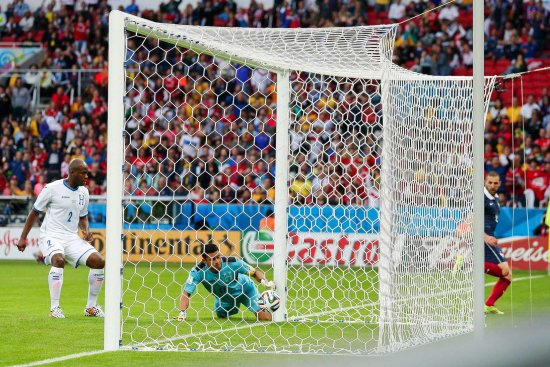
Goal-line technology was for the first time used to determine a World Cup goal on Sunday, when France beat Honduras 3-0. But some people still claim that the innovation spoils the beautiful game
Honduran keeper Noel Valladares had a bad Sunday. A strike by French striker Karim Benzema ricocheted off the post and onto his left hand, trickling a few inches over the goal-line before he could scoop it away. Valladares attempted to quickly restart the game, and in any other World Cup he would likely have gotten away with it. This time, however, seven cameras around his half of the pitch had already triangulated the exact location of the ball, and conveyed a simple message to a watch around the referee’s wrist: GOAL.
[time-brightcove not-tgx=”true”]
It may not have been beautiful, but it was historic nonetheless: the first international football goal decided by goal-line technology. A long-awaited debut, not least for the countless millions who have seen their team’s World Cup destinies altered by dubious decisions in the past. Yet the innovation — long in use in pursuits like tennis, cricket and snooker — has been a curiously fraught topic within the world’s most popular sport.
Many have claimed that new technologies will taint the beautiful game, making it less “human.” Ahead of the 2010 World Cup in South Africa, FIFA president Sepp Blatter said, “The game must be played in the same way no matter where you are in the world.” Only weeks later, in the knockout stage of the same tournament, England’s Frank Lampard had a goal disallowed that would have leveled their round-of-16 match against Germany. Replays confirmed the blatant inaccuracy of the decision across the globe, and tilted opinion.
At Brazil 2014, each of the dozen stadiums have been equipped with the German GoalControl technology, consisting of 14 high-speed cameras positioned around the pitch. The ball’s position is continuously captured in 3-D, and the referee is notified within a second if a goal has been scored.
In the opening-round game between France and Honduras, confusion was still sown, as the system initially indicated that Benzema hadn’t scored, as his strike came off the post. Fans across the stadium booed the technology as the decision changed.
The debate will no doubt continue regarding the technology. Perhaps it’s of some comfort to Noel Valladares that they were already down 1-0, and the decision was correct. At that second, though, few could blame millions of Hondurans for avowing Luddite tendencies.